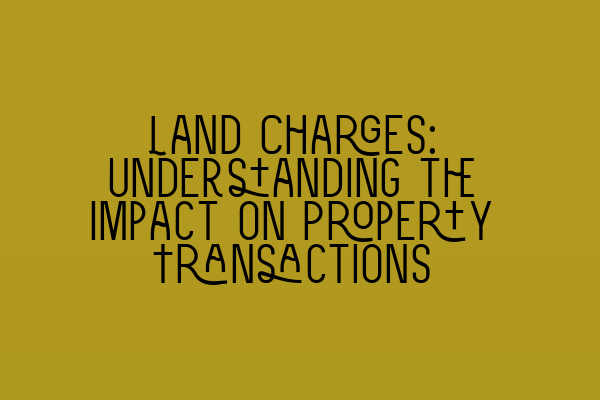Land Charges: Understanding the Impact on Property Transactions
As a property solicitor, understanding land charges is crucial in facilitating smooth and well-informed property transactions. Land charges are legal interests or restrictions that can affect the title and use of a property. They can have a significant impact on the buyer, seller, and other parties involved in the transaction. In this blog post, we will delve into the intricacies of land charges, their classifications, and the implications they have on property transactions.
1. What are Land Charges?
Land charges are legal interests or restrictions that are registered against the title of a property. These charges are created by various statutes and regulations in order to protect third-party interests and enforce legal obligations. They provide an important source of information to purchasers, lenders, and other parties involved in property transactions.
2. Classifications of Land Charges
There are two main classifications of land charges: Class A and Class B charges. Class A charges are statutory charges that are registered against the title of the property. They include charges such as mortgages, long leases, and charges created by court orders. These charges are usually registered with the Land Registry and are easily identifiable.
On the other hand, Class B charges are a diverse range of equitable interests and restrictions that are not readily identifiable from the register. These charges include restrictive covenants, easements, and rights of way. They are not registered with the Land Registry and require additional searches to identify.
3. Impact on Property Transactions
The presence of land charges can have a significant impact on property transactions. Buyers need to be aware of the charges registered against the property they intend to purchase as they may affect their rights and obligations as the new owner. Lenders also rely on the information provided by land charges to assess the risk associated with providing a mortgage.
For example, a property with a Class A charge, such as an existing mortgage, might require the buyer to take on the responsibility of repaying the outstanding loan amount. Failure to identify and account for such charges can result in legal disputes and financial liabilities down the line.
Similarly, Class B charges, such as restrictive covenants, can restrict or prohibit certain activities on the property. These restrictions may impact the buyer’s intended use of the property, such as building extensions or running a business. It is crucial for buyers to understand and assess the implications of these charges before proceeding with the purchase.
4. Conducting Land Charge Searches
To ensure a comprehensive understanding of a property’s land charges, it is essential to conduct thorough searches. These searches typically involve examining the Land Registry records, local authorities, and other relevant sources of information.
For Class A charges, a search with the Land Registry is usually sufficient to obtain the necessary information. This search will provide details of mortgages, long leases, and other registered charges against the property.
However, for Class B charges, additional searches may be required. These searches can include checking local authority records for planning restrictions and regulations, reviewing the property’s title deeds, and consulting with specialist search providers to uncover any hidden interests or restrictions.
5. Seek Professional Advice
Due to the complexity and potential financial implications of land charges, it is strongly recommended to seek professional advice from a qualified property solicitor. They will be able to guide buyers, sellers, and lenders through the process, ensuring that all necessary searches are conducted, and the impact of land charges is fully understood.
Understanding land charges and their impact on property transactions is essential for a successful and hassle-free purchase or sale. By conducting thorough searches and seeking professional advice, buyers and sellers can navigate the intricacies of land charges and make informed decisions.
In conclusion, land charges play a crucial role in property transactions, providing important information about legal interests and restrictions that can affect a property’s title and use. By understanding the classifications of land charges, their impact on transactions, and conducting thorough searches, buyers and sellers can protect their interests and make informed decisions. To ensure a smooth and successful property transaction, it is advisable to seek professional advice from a qualified solicitor who specializes in property law.
Related articles:
– Interested in practicing some exam questions? Check out our SQE 1 Practice Exam Questions.
– Want to see how well-prepared you are? Try our SQE 1 Practice Mocks FLK1 FLK2.
– Looking to prepare for your SQE 2 exams? We offer comprehensive SQE 2 Preparation Courses.
– Need to brush up on your knowledge for the SQE 1 exams? Explore our SQE 1 Preparation Courses.
– Planning to take the SRA SQE exams? Stay updated with the latest SRA SQE Exam Dates on our website.
Note: This blog post is for informational purposes only and should not be considered legal advice. Always consult a qualified solicitor for professional advice tailored to your specific situation.
